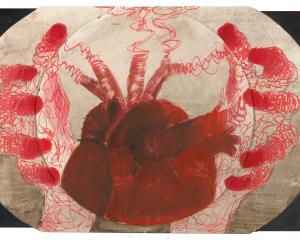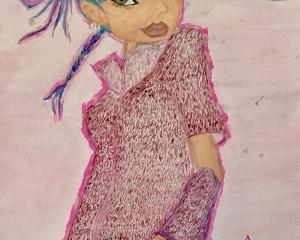
Every day, we grow and learn, attempting to find ourselves, but is it really authentic?
In a society based around social image and normality imitation, influence is a regular occurrence.
We walk down the street wanting to blend in, to stand out, to be ourselves, as we copy every little piece of human behaviour we deem fit.
All the while, igniting the capitalistic rituals that are ongoing and prevalent in our society.
In a society that warps the image we have of ourselves for profitable gain, standing out from the crowd is only another business scheme.
We reshape our lives to subsequently create what we identify to be our true self, but how much of it is real?
We can fight for our own rights.
Fight for the rights that were stolen unapologetically from generations before us.
Fight for our right to love who we want.
Fight for our right to live in a safe, foreseeable future where we are not fighting for limited land as we lay down our last tree to write one final SOS message.
Yet we are still being viewed through a lens that, in the corporate market’s eyes, screams "profit!".
Corporate entities don’t mind rebellious acts when they can profit from it.
They strip revolutionaries of any relevance or strength as soon as people buy into their ideals, which leaves them as simply a figurehead.
When you try to stand up for something, capitalism only exploits you by profiting off the people who support you, packaging and selling both you and your ideals.
Built around the exploitation of material conformity, capitalism holds responsibility for many societal inequities, acting as an enabler for the already able.
Yet could we also hold it responsible for the mass production of ourselves and subsequent corruption of self-authenticity?
So how can we be authentic in a world that benefits from our cookie-cutter nature? It’s hard to eliminate capitalism.
It has helped many people in its time, but those people don’t include minority groups.
The benefits that capitalism provides are reserved for the privileged.
In a world that wants to expand and innovate, "finding yourself" is a desirable prize which people are constantly ravenous for.
But is this a realistic endeavour?
Let’s say you aren’t Pakeha.
You’re affected by gender bias. You can’t afford a home. You weren’t born into money.
Further education is untenable or you’ve been discriminated against for any of the number of things our society deems unworthy.
How can you break free of this machine that feeds on your self-doubt?
Only the privileged benefit from this capitalistic system but being privileged is also the key to our way out.
If you’re already privileged, you have society telling you that you’re good enough, that you can find who you really are.
If that is going off the rails and isolating yourself in search of a better way, a better society, that’s OK.
Our society we live in now will allow that to happen because the blueprint for this machine was built for you.
You can find your true self.
But if that doesn’t sound like you, then those self-help books aren’t for you.
You can look but not touch, because to better yourself you have to be born "better" in the first place.
The systemic problem of authenticity in our capitalistic society is an ongoing battle. But we can acknowledge that it needs to change.
We need to have hope and strength to challenge this ingrained pattern of self-doubt and degradation imprinted on society by capitalism.
And it must be the privileged who do this because it is the privileged who can afford to lose in the process.
I am privileged.
I’m a Pakeha, middle-class citizen that is educated enough to sit here and write about how unlucky life can be, and in that lies the problem.
This problem can’t be fixed by you completing the quest to becoming your true self in order to implicate change.
It doesn’t work when you, the individual, aren’t to blame for this systemic problem.
Who knows who your "true self" is, when you will always be influenced by experiences and people.
Maybe the best way to truly accept yourself is to not accept any of it and embrace the idea of change.
Nothing will truly change until the privileged consciously recognise their position in this system and are willing to give this up for the benefit of all.












